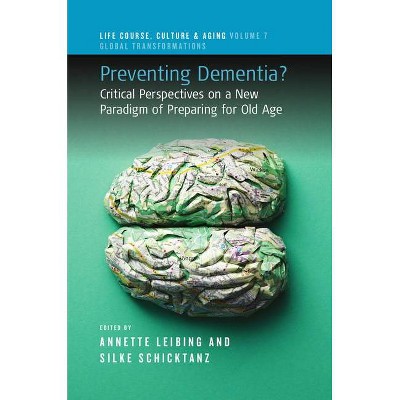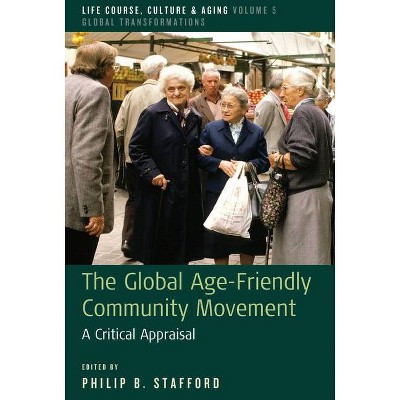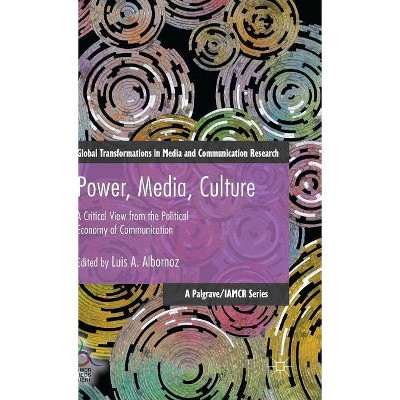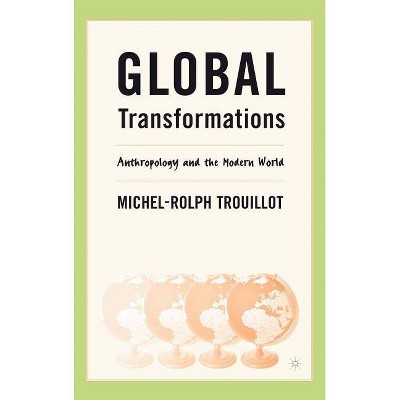Preventing Dementia? - (Life Course, Culture and Aging: Global Transformations) by Annette Leibing & Silke Schicktanz (Hardcover)

Similar Products
Products of same category from the store
AllProduct info
<p/><br></br><p><b> About the Book </b></p></br></br>"The conceptualization of dementia has changed dramatically in recent years with the claim that, through early detection and by controlling several risk factors, a prevention of dementia is possible. Although encouraging and providing hope against this feared condition, this claim is open to scrutiny. This volume looks at how this new conceptualization ignores many of the factors which influence a dementia sufferers' prognosis, including their history with education, food and exercise as well as their living in different epistemic cultures. The central aim is to question the concept of prevention and analyze its impact on aging people and aging societies"--<p/><br></br><p><b> Book Synopsis </b></p></br></br><p> The conceptualization of dementia has changed dramatically in recent years with the claim that, through early detection and by controlling several risk factors, a prevention of dementia is possible. Although encouraging and providing hope against this feared condition, this claim is open to scrutiny. This volume looks at how this new conceptualization ignores many of the factors which influence a dementia sufferers' prognosis, including their history with education, food and exercise as well as their living in different epistemic cultures. The central aim is to question the concept of prevention and analyze its impact on aging people and aging societies.</p><p/><br></br><p><b> Review Quotes </b></p></br></br><br><p> <em>"In provoking [critical] questions, this collection provides a highly informative but also political take on the changing face of dementia prevention internationally. This will be illuminating to social science and bioethics scholars, as well as policymakers and public health practitioners engaged in dementia prevention, chronic illness, and ageing throughout the life course."</em> <strong>- Sociology of Health & Fitness</strong></p> <p> <em>"</em>Preventing Dementia <em>offers timely critical insight into this 'new dementia' - a predictable and preventable midlife disease process. All academics in dementia studies will benefit from this book, and while background knowledge is required to get the most out of it, there is also considerable fodder for scholars across the medical social sciences, that is the reconceptualisation of ageing and the limits of responsibilisation."</em> <strong>- Dementia</strong></p> <p> <em>"These are excellent contributions by some of the most important critical scholars working in areas of age studies, neuroculture and health promotion. It is interdisciplinary and international in scope, and the editors have done an excellent job in producing a well-organized, well-framed and coherent volume."</em> <strong>- Barbara L. Marshall</strong>, Trent University</p> <p> <em>"This is an excellent edited volume on dementia prevention... There are three parts: discursive and social practices of dementia prevention; from prediction to prevention; and normative claims of prevention. The individual chapters are of equal quality and the overall framing by the editors is compelling."</em> <strong>- Stefan Ecks</strong>, University of Edinburgh</p><br><p/><br></br><p><b> About the Author </b></p></br></br><p> <strong>Annette Leibing</strong> is a medical anthropologist and Full Professor at Université de Montréal. Her research focuses mostly on issues related to aging, by studying - as an anthropologist - Alzheimer's and Parkinson's in different contexts, aging and psychiatry, pharmaceuticals, elder care and, stem cells for the body in decline, among others.</p>
Price History
Price Archive shows prices from various stores, lets you see history and find the cheapest. There is no actual sale on the website. For all support, inquiry and suggestion messagescommunication@pricearchive.us




















